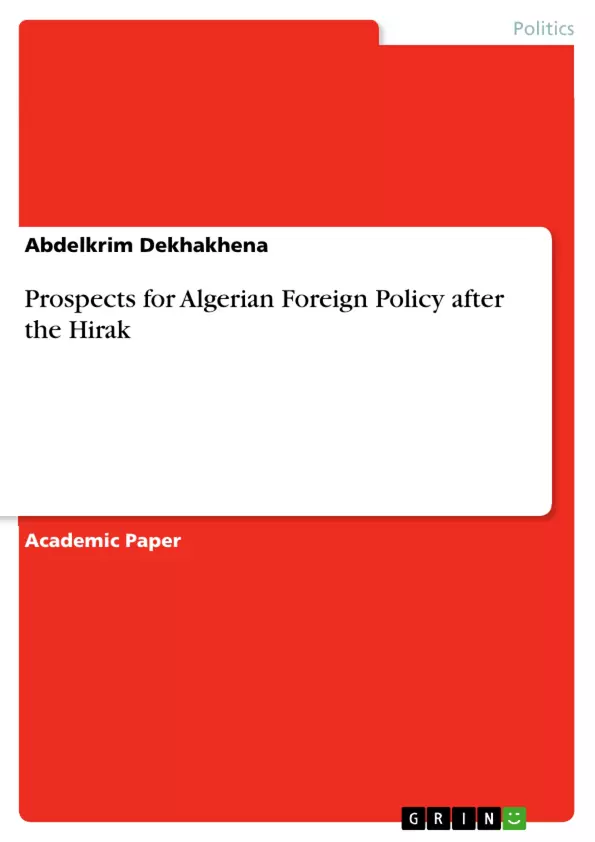Following the resignation of President Abdelaziz Bouteflika under pressure from the street, analyses of political change in Algeria have primarily focused on the domestic processes of transition and paid relatively less attention to the influence they might have on changes in the country’s foreign policy. As the country moves towards a change of leadership, a new generation of politicians will emerge with the demise of the so-called "Old Guard." These developments have raised questions about whether these changes will affect the country’s future positions on regional and international issues in general. The recent maneuvers of Algerian diplomacy enable strategic shifts to be observed and the scope of foreign policy change—or continuity—to be assessed. The main question, however, is how Algeria’s foreign policy will fair in the country’s new political era. Should there be basic and serious changes in foreign policy orientation? The present article is written with the aim of shedding light on the foreign policy of Algeria following the recent uprising and analyses the possible diplomatic directions that the change might bring in response to public demands.
Inhaltsverzeichnis (Table of Contents)
- ABSTRACT
- INTRODUCTION
- THE DOCTRINAL PRINCIPLES OF THE ALGERIAN FOREIGN POLICY
- The Militant Legacy
- A Doctrine in Disarray
- Challenges in the Aftermath of the Cold War
- Revival and the End of Isolation
- Inertia in a Moving World: Crisis between Principles and Interests
- THE CENTERS OF ALGERIAN FOREIGN POLICY DECISION-MAKING
- The Presidency
- The Military Institution
- The Ruling Elite and National Interest
- The Military's Involvement in Foreign Policy
- A NEW PARADIGM
- An Importunate Environment
- Ascendancy Frustrated
- Crossing the Rubicon: The Immediate Challenge
- Restoring Roles and Revitalizing Diplomatic Dexterity
- PERSPECTIVES OF THE 'HIRAK' ABOUT FOREIGN POLICY
- The Hirak Dynamic
- President Tebboune Outlines Algeria's 'New' Foreign Policy
- Back on Stage: The Road Map
Zielsetzung und Themenschwerpunkte (Objectives and Key Themes)
This article aims to analyze the potential impact of the recent social uprising in Algeria on the country's foreign policy. It explores whether this change in leadership will result in significant shifts in Algeria's stance on regional and international issues or maintain continuity with previous policies.
- The role of the Hirak social movement in shaping Algeria's foreign policy objectives.
- The interplay between domestic politics and foreign policy decision-making in Algeria.
- The influence of historical legacies and international pressures on Algeria's foreign policy.
- The potential for change or continuity in Algeria's regional and international relations.
Zusammenfassung der Kapitel (Chapter Summaries)
The article begins by exploring the historical context of Algerian foreign policy, outlining its doctrinal principles and the evolution of its approach to international relations. The analysis examines the role of various actors in foreign policy decision-making, including the presidency, the military, and the ruling elite. It then delves into the impact of the Hirak movement on foreign policy perspectives, analyzing the potential for a "new paradigm" in Algeria's diplomatic approach.
Schlüsselwörter (Keywords)
This article focuses on the foreign policy of Algeria, particularly its potential for change or continuity in the aftermath of the Hirak social movement. Key terms include Algeria, foreign policy, change or continuity, the Hirak social movement, international relations, and regional issues.
Frequently Asked Questions
What was the Hirak movement in Algeria?
The Hirak was a sustained series of peaceful protests that began in 2019, leading to the resignation of long-time President Abdelaziz Bouteflika.
Has Algeria's foreign policy changed significantly after the Hirak?
While there is a push for a "new" foreign policy under President Tebboune, many core doctrinal principles, such as non-interference, show strong continuity.
Who are the key decision-makers in Algerian foreign policy?
Foreign policy is primarily shaped by the Presidency and the military institution, which plays a significant role in national security and regional stability.
What are the traditional principles of Algerian diplomacy?
Traditional principles include anti-colonialism, support for self-determination, non-alignment, and the principle of non-interference in the internal affairs of other states.
What challenges does Algeria face in its regional environment?
Algeria faces challenges related to the conflict in Libya, tensions with Morocco over Western Sahara, and security threats in the Sahel region.
- Quote paper
- Dr. Abdelkrim Dekhakhena (Author), 2022, Prospects for Algerian Foreign Policy after the Hirak, Munich, GRIN Verlag, https://www.grin.com/document/1355103



